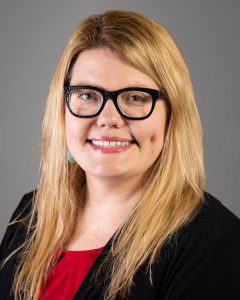
Katie Edwards, director of the Interpersonal Violence Research Laboratory and associate professor, CYFS and educational psychology, is leading research to better understand how sex trafficking survivors regard the services they receive — and to learn what services they find most helpful.
“We want to identify not only barriers to accessing services and why survivors access some services and not others, but also what works in promoting recovery,” said Edwards, the project’s principal investigator. “There is very little research on survivors, so part of the project is to examine what survivors need to heal and recover so we can effectively support survivors on their journey.”

The project is funded by a grant from the U.S. Department of Justice–National Institute of Justice, and is a collaborative effort among survivors, practitioners and researchers.
Information will be gathered from sex trafficking survivors who have received, or are receiving, services at Call to Freedom (CTF), a nonprofit organization in Sioux Falls, South Dakota, that provides comprehensive, trauma-informed services to survivors.
Call to Freedom offers emergency addiction services coordination, case management, employment and housing support services, and occupational therapy. The organization also partners with community-based providers to help survivors access mental health care, medical and dental services, and legal services.
One aim of the study, Edwards said, is to document enrollment rates and assess client acceptability of research procedures from the organization’s clients.
Additionally, researchers will interview 135 survivors with varying levels of Call to Freedom services to learn why they used specific services and how those services aided their recovery, and to gather input on how to improve services.
Findings will be used to create a toolkit with information to help practitioners effectively support sex trafficking survivors, including best practices for evaluating available services

“For survivors of sex trafficking, trust can understandably be hard for them,” said Becky Rasmussen, executive director of Call to Freedom. “If a survivor came to us for help and we weren’t successful in helping, or didn’t help enough, we want to know why.”
Identifying the myriad of needs of sex trafficking survivors is crucial, she said.
“Each journey is different for each individual,” Rasmussen said. “Trafficking survivors have diverse needs — there is no cookie-cutter way to effectively serve them.”
Rasmussen noted that in 2016 — Call to Freedom’s first year — the center served 30 sex trafficking survivors. As of September 2021, the center had 216. Forty-two percent were Native Americans.
Along with Edwards and Rasmussen, other project team members include Shana Cerny, associate professor of occupational therapy, University of South Dakota; Bridget Diamond-Welch, associate professor of family medicine at the University of South Dakota; Ashton Ekdom, program development and occupational therapy manager, Call to Freedom; and Lorey Wheeler, CYFS research associate professor and co-director of the Nebraska Academy of Methodology, Analytics and Psychometrics.
This project demonstrates the importance of partnerships among researchers, survivors and practitioners. Together, we can do more profound work and generate more positive outcomes for survivors than if we work alone.”
— Katie Edwards, associate professor, CYFS and educational psychology
Edwards said she is confident the project will not only highlight the critical need for organizations such as Call to Freedom, but also serve as a model for other organizations to provide comprehensive, coordinated services to survivors of human trafficking.
“This project demonstrates the importance of partnerships among researchers, survivors and practitioners,” she said. “Together, we can do more profound work and generate more positive outcomes for survivors than if we work alone.”
Edwards is also involved in two other studies — both funded by the Department of Justice — focused specifically on sex trafficking prevention and victim recovery among Native Americans.
Learn more about this project in the CYFS Research Network. This study aligns the UNL Grand Challenge of health equity.
